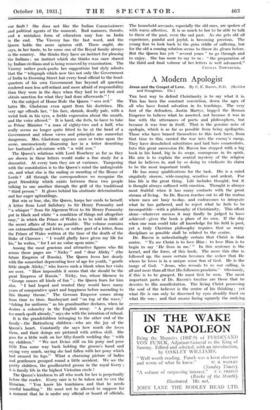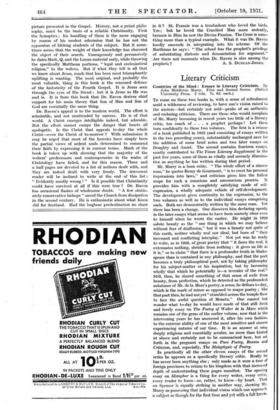A Modern Apologist
THE best way to defend Christianity is to say what it is. This has been the constant conviction, down the ages of all who have found salvation in its teachings. The very first of the defenders, Justin Martyr, begged the Roman Emperor to believe what he asserted, not because it was in -line with the utterances of poets and philosophers, but because it was true in itself. That is the genuine note of apologia, which is as far as possible from being apologetic. Those who have braced themselves to this task have, from that time to this, carried the war into the enemy's 'camp. They have demolished substitutes and laid bare counterfeits. Into this great succession Dr. Raven has stepped with a big book in his hand, big in its scope, courageous in its spirit. His aim is to explain the central mystery of the religion that he believes in, and by so doing to vindicate its claim to be the most important truth.
He has many qualifications for the task. His is a mind singularly sincere, wide-ranging, sensitive and ardent. For him life is the great thing. Life includes thought, but it is thought always suffused with emotion. Thought is always most fruitful when it has many contacts with the great stream of living. So Dr. Raven reaches out to all the realms where men are busy to-day, and endeavours to integrate what he has gathered, and to reject what he feels to be incompatible—with a philosophy of Christianity. This effort alone—whatever success it may finally be judged to have achieved—gives the book a place of its own. If the day when one man could take all knowledge for his field is past, yet a truly Christian philosophy requires that as many disciplines as possible shall be related to the centre.
Dr. Raven is unhesitatingly certain that Christ is that centre. " To see Christ is to love Him : to love Him is to begin to say ' He lives in me.' " In this sentence is the kernel, and the force, of this book. The more this clue is followed up, the more certain becomes the seeker that He whom he loves is in a unique sense Son of God. He is the image of God. " Jesus, who reveals to us our calling, is all and more than all that His followers proclaim." Obviously, if this is to be grasped, He must first be seen. The most important parts of Dr. Raven's treatise are those that he devotes to His manifestation. The living Christ possessing the soul of the believer is the centre of his thinking ; yet what He is can only be discerned by eyes steadily fixed on what He was ; and that means facing squarely the undying picture presented in the Gospel. History, not a priori philo- sophy, must be the basis of a reliable Christianity. First the Synoptics : his handling of them is the more engaging by reason of his modest admission that he has not the apparatus of lifelong students of the subject. But it some- times seems that the weight of their knowledge has obscured the object of their search. Courageously and persuasively he dates Mark, Q, and the Lucan material early, while throwing the specifically Matthean portions, " legal and ecclesiastical religion," to the wolves. But if what they tell is all that we know about Jesus, much that has been most triumphantly uplifting is wanting. The most original, and probably the most valuable, thing in this book is the reasoned defence of the historicity of the Fourth Gospel. It is Jesus seen through the eyes of His friend : but it is Jesus as He was and is. It is from this book that Dr. Raven derives chief support for his main theory that Son of Man and Son of God are essentially the same thing.
Dr. Raven's appeal is to the modern world. The effort is admirable, and not unattended by success. He is of that world. A Christ emerges intelligible indeed, but adorable. But the effort cannot escape the danger that besets all apologetic. Is the Christ that appeals to-day the whole Christ—even the Christ of to-morrow ? With submission it may be urged that most of the heresies have simply been the partial views of ardent souls determined to commend their faith by expressing it in current terms. Much of the book is taken up with showing that the majority of the writers' predecessors and contemporaries in the realm of Christology have failed, and for this reason. Three and a half pages are devoted to a list of authors dealt with, and they are indeed dealt with very firmly. The irreverent reader will be inclined to write at the end of this list : " Evidently mostly wrong ! " Is it possible that Christianity could have survived at all if this were true ? Dr. Raven has occasional flashes of wholesome doubt. " A few obstin- ately conservative bishops " saved the Church from dissipation in the second century. He is enthusiastic about what Knox did for Scotland. Had the bugbear predestination no share in it ? St. Francis was a troubadour who loved the birds. Yes ; but he loved the Crucified Man more ardently, because in Him he saw the Divine Passion. The Cross is some- thing more than a typical example. What it was Dr. Raven hardly succeeds in integrating into his scheme. Of the Barthian he says : " The school has the prophet's privilege of substituting rhetoric and denunciation for argument." Are there not moments when Dr. Raven is also among the



















































 Previous page
Previous page